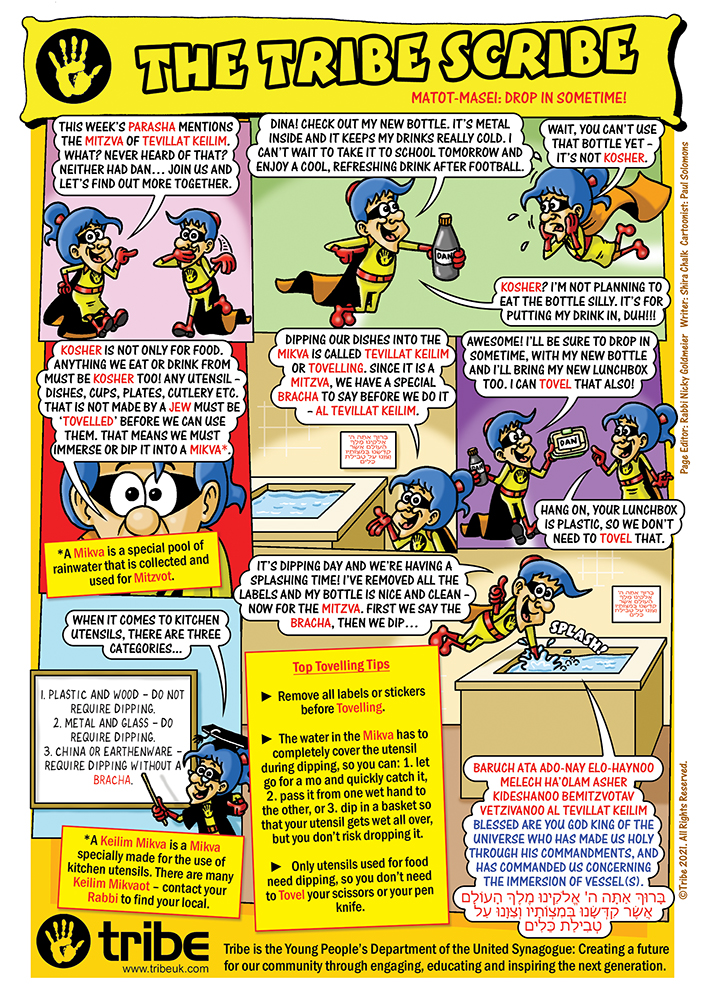Bonjour / Hello [nickname_else_first_name],
Table of contents
1) Perashat Hashavoua - Rabbi Eli Mansour
2) Halakhat Hashavoua (Halakhot related to day to day life) By Hazzan David Azerad -
When Av Arrives, We curtial our Joy - Peninei Halacha
3) Holy Jokes!
4) For KIDS

This Week's Parasha Insight with Rabbi Eli Mansour
Parashat Matot-Maseh: Following the Example of Aharon Ha’kohen
The Torah in Parashat Maseh briefly mentions the death of Aharon Ha’kohen, noting that he passed away on Rosh Hodesh Ab – a day which always falls around the time of the Shabbat when we read Parashat Maseh.
The Mishna in Masechet Abot instructs us to "be among the students of Aharon Ha’kohen, who loved peace, pursued peace, loved people, and drew them close to Torah." Aharon distinguished himself specifically in the area of peaceful relations among people. It is therefore appropriate that we read about his passing during this period of year, when we mourn the destruction of the Bet Ha’mikdash, which was the result of Sin’at Hinam (hatred among Jews). Aharon represents the diametric opposite of Sin’at Hinam, as he pursued peaceful relations with all people, and his example is one which we must follow in order to correct the mistake that caused the Jewish Nation’s exile.
However, the Mishna speaks not only of Aharon’s devotion to peace, but also of his efforts to bring his fellow Jews closer to Torah observance: "loved people, and drew them close to Torah." The Mishna uses here the word "Beriyot" ("people"), which refers to people on the lowest spiritual levels. The word "Beriya" literally means "creature" – something that was created. A "Beriya" is thus a person whose only achievement is the fact that he was created, who has not accomplished anything more than simply existing. Aharon truly loved even the Beriyot. He was genuinely devoted to all his fellow Jews, and rather than reject or ignore the "Beriyot," he loved them and worked with them in an effort to inspire them to grow.
This quality, too, is something we must try to emulate as we seek to become worthy of the end of the exile and the rebuilding of the Bet Ha’mikdash. The name of this month – "Ab" – is spelled "Alef," "Bet." The word "Alef" means "to teach," and the letter "Bet" represents the word "Bina" –wisdom. After a person learns and acquires knowledge, he bears the responsibility of sharing his knowledge with other people. This must be one of our goals during this period of mourning – to commit ourselves to spreading Hashem’s word and positively influencing our fellow Jews. This is the time to redouble efforts to pursue peace, to love all Jews regardless of their religious background, regardless of whether they are more, less, or just as observant as we are, and make every effort possible to inspire and uplift other Jews so they will draw closer to Torah.

Halachot this week are selected and Translated by Hazzan David Azerad
When Av Arrives, we Curtail our Joy -- Peninei Halacha
The Sages state in the Mishna (Ta’anit 26b), “When Av arrives, we curtail our joy,” because this is a mourning period over the Temple’s destruction. Therefore, one should not engage in joyous activities like hikes, hotel vacations, and social gatherings. Communities may schedule only events whose main purpose is educational or communal. In addition, one who needs to relax for health reasons may take a vacation in a hotel or a convalescent home.
One may not sew or knit new clothes or crochet a yarmulke during the Nine Days (SA 551:7-8). However, one may mend old clothes. One who makes a living sewing clothes or manufacturing material, and needs the income from the Nine Days, should ask a Torah scholar how to act.
It is best to cancel sewing lessons during the Nine Days, but if necessary, one may continue them, on condition that the students do not engage in sewing new garments. Rather, they should mend old ones or practice sewing on useless pieces of cloth.
The Sages also say that during this period, one should curtail business dealings that are joyous. It is even proper to decrease one’s involvement in all types of transactions. We also avoid joyous building projects and plantings. (section 18). Since we curtailed our joy during this period, it became customary to refrain from consuming meat and wine, which make one happy.
Since this is a period of calamity, the Sages recommend that one who is involved in a legal dispute with a non-Jew should avoid going to court in the month of Av because the Jewish people have bad fortune during this time and he is liable to lose the case (SA 551:1)The simple understanding is that one should avoid interacting with the non-Jew until Tisha Be-Av, but afterward one may contend with him as he would throughout the year. Korban Netanel quotes this interpretation in the name of the Zohar. ma, however, cites Rabbeinu Yeruĥam as saying that one should avoid interacting with non-Jews throughout the month of Av.
Bevirkat Shabbat Shalom Umevorach
David Azerad
3) HOLY JoKeS!!
Selection of funny snippets, loosely related to this weeks parashah or current events, to brighten your day


4) FOR KIDS
Click on the image to open the youtube video












